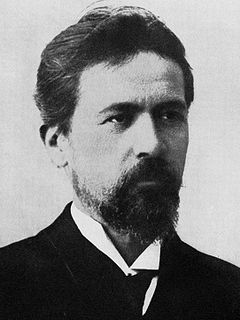March 22,2010
Ok, in today’s age, an answer to the above question is just a click away. It is convenient but do we really grasp the information? Does the life of Chekhov unfold in front of your eyes? And so the “Who is….” series from the UMS, was very informative and entertaining. And relevant. As it was looking at Chekhov’s life in order to understand more about “Uncle Vanya”.
“Who is Anton Chekhov” consisted of two parts- a presentation on Chekhov’s life by Professor Makin and a talk by Kate Mendeloff about the challenges in directing “Uncle Vanya”. There was also a scene from “Uncle Vanya”, enacted by Residential College students.
Professor Michael Makin, from the department of Slavic Studies, started this presentation on Chekhov, in his very charming accent. His delivery was quick and very erudite and it goes to show how well he knows the subject matter at hand. Anyway, so who was Anton Chekhov?
Unlike all the popular Russian writers who were counts or members of the Russian nobility, Anton Chekhov was born to a serf as the third of six surviving children. He attended a gymnasium- comparable to our English grammar school. His father went bankrupt and fled to Moscow leaving his children and wife behind. Anton joined medical school and also took over the responsibility for the whole family. To pay his tuition fess and to support his family, he wrote stories and sketches.
He became a physician and suffered from tuberculosis for a long time. Chekhov didn’t take his writing seriously until Dmitry Grigorovich, one of the leading Russian writers of the time sent him a letter telling him about his immense talent. Chekhov’s artistic ambition bloomed and he soon won a Pushkin Prize for the short-story collection- “At Dusk”. From being the son of an impoverished serf, he became a landowner when he bought the small estate of Melikhovo.
Ok, so how is this all relevant?
It is important for us to understand Chekhov as a person before we understand Chekhov as a playwright or writer- as most of who he was and what he valued can be reflected in his characters and work. Well, Chekhov wrote what he saw and about a life that he was immersed in. His writings abound with references to the simple country life and the trials faced by a Russian in those days. It is also important to understand his background as to why he stands out from among the other Russian writers.
That said, Professor Makin told us that as a playwright, Chekhov was a flop initially. His plays “the Sea Gull” and “the wood demon” were fiascos when they were first staged. To some extent, they were way ahead of their times as they lacked the melodrama. They were waiting for the right people to act and direct it. Everytime, Chekhov failed as a playwright, he threatened never to return to it. But he always came back.
The innovative Moscow Art Theatre found by Stanislavski for doing “naturalistic” theatre was what Chekhov needed. The production of “The Seagull” by Stanislavski was a huge success. Subsequently, Chekhov wrote his other plays for the Moscow Art Theatre and “Uncle Vanya” is one of them.
“Uncle Vanya” is the story of Vanya (duh!), who is the uncle of Sonya (Actually it is a cleaned-upversion of “The wood demon”). He takes care of Sonya’s farm which was bequeathed to her by her now deceased mother. The two of them send the proceeds from the farm to Professor Serebryakov. The Professor marries a woman who is very young , Elena and sicne he can’t afford to live in the city anymore, he comes back to the country estate. This arrival causes such a ruckus in the lives of Vanya and Sonya.
So the plot is about Vanya feeling that he has totally wasted his life and what he does. Why Chekhov called it a comedy is unclear. Though it has a few laughs in it, I don’t think it is comedy.
Professor Kate Mendeloff explained how Chekhov and his plays helped in actually laying out the foundation of the rules for all theatre and acting today. The techniques and methods developed by Stanislavski are taught in every drama school today.
Residential college is putting up a production of “Uncle Vanya” which Mendeloff is directing. They enacted a scene from it. It was the opening act where the “long night” where the professor keeps everyone up by his constant griping is shown. It was interesting and cleverly done.
On the whole, it was a very interesting session. It made me wonder as to how how much of the writer was in the character they created and how much of it was what the writer wanted to be.





